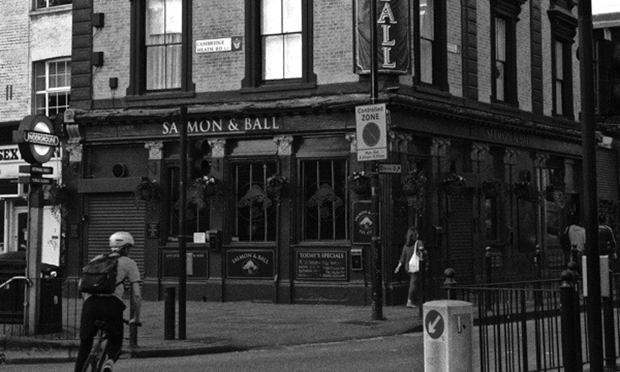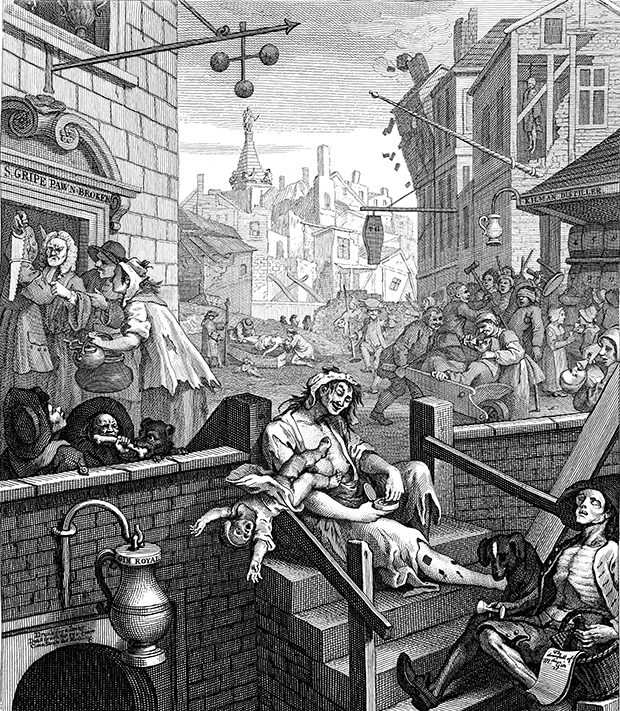The Boss of Bethnal Green: Joseph Merceron, the Godfather of Regency London – review: biography of a local tyrant

The Salmon and Ball pub on the corner of Bethnal Green Road, outside which two men, who had been found guilty of ‘loom-cutting’, were publicly hung during Merceron’s ‘rule’ over the area
Joseph Merceron – businessman, magistrate and unscrupulous crook – was born to a pawnbroker in Brick Lane in 1764. By his early 20s, having achieved some financial success trading in property, he was signing his name with a four-inch autograph of such extravagance that it warrants attention in Julian Woodford’s rigorous new biography, The Boss of Bethnal Green.
“According to graphology manuals,” Woodford explains, “its exaggerated size, underlining and rightward slant indicate attention-seeking, recklessness and egocentricity” – and the rest.
Merceron’s rule over Bethnal Green, from the 1780s through to the 1830s, was ruthless and spanned a complicated, difficult period for the area. The district was on its knees: it was a time of political unrest, driven by the revolution in France and the war that followed, with a local population given to violent rioting. There were public executions – outside the Salmon and Ball, for example. Sanitation was appalling, the vestry was riddled with corruption and the poorhouse was packed to the rafters. The conditions of slum life, which Merceron was loath to alleviate, were dire.
As treasurer for half a century, he presided over the poor rate, a tax levied in each parish to relieve the effects of poverty. His biographer describes how on numerous occasions Merceron – if it meant recruiting support, ruining an opponent or simply bolstering his already sizeable bank account – would alter the figures, raising or lowering the rates according to his fancy.
This was only part of a system of abuse of his huge parochial power in order to fill his own pockets; he was quite literally paving the streets with hooky contracts and under-the-table deals.
For the Boss, money was everything and, as a result, Woodford’s meticulous study is heavy on surprisingly riveting financial detail. His prose style, however, is light and pacey. He skips through the years without wasting a word, slowing at key points to divulge heaps of fascinating analysis. His readable manner is a necessary antidote to what can feel like a relentless catalogue of atrocities, such as the time Merceron pitilessly robbed a disabled young woman, Mary Cheeseman, of her inheritance.
Cue the book’s heroes. Just as Merceron’s tyrannical rule starts to feel utterly unchallengeable, a series of irate opponents confront his autocratic reign, with varying degrees of success.
Roughly two thirds in, it seems the end is nigh for the villain. It’s as if Woodford has been building to such a comeuppance since page one. Merceron is in court, charged with using the poor rate fund to pay off his own legal fees, and he’s about to take the stand.
It’s a thrilling moment that marks the beginning of the end for the original East London gangster. Or does it?
Ten years in the making, The Boss of Bethnal Green is essential reading for anyone interested in the criminal and political histories of our city, and how the two interweave.
The Boss of Bethnal Green: Joseph Merceron, the Godfather of Regency London is published by Spitalfields Life Books. ISBN: 978-0957656963. RRP: £20

Urban desolation: Gin Lane by William Hogarth (1751)
